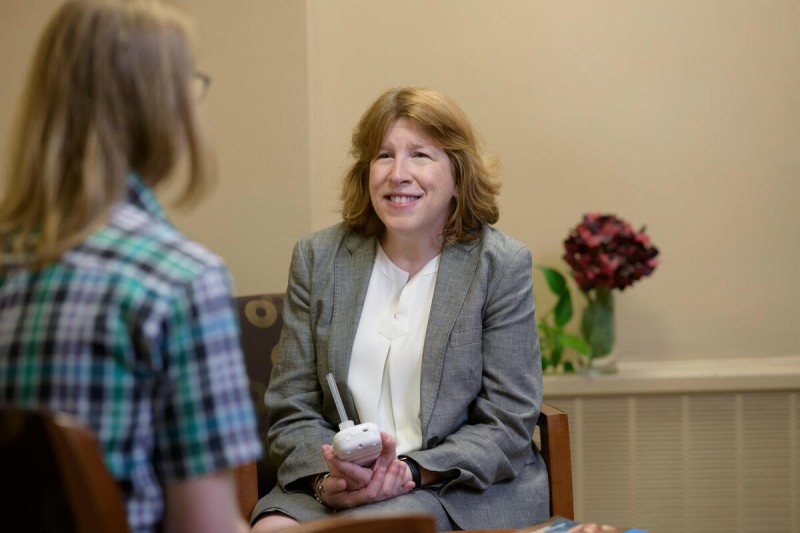
More than half of people with lung cancer say they have been stigmatized by friends, family, and even healthcare providers at some point in their cancer journey. Other people may assume, because lung cancer is often caused by smoking, that the patient is to blame.
But as smoking rates go down, an increasing proportion of people with lung cancer have never smoked. And the majority of cases are in former smokers who have successfully quit.
“Anyone who has lungs can develop lung cancer, including those who have never smoked,” says Memorial Sloan Kettering Cancer Center (MSK) behavioral scientist Smita Banerjee, PhD, who studies lung cancer stigma. “But even when someone is currently smoking or previously smoked, it’s important to remember that nobody brings cancer onto themselves. Nicotine cigarettes are a serious addiction, and no one should ever be blamed for their cancer.”
Lung cancer stigma too often leads to missed opportunities to be screened for lung cancer and to quit smoking. Learn what MSK is doing to help end lung cancer stigma.
Lung Cancer Stigma Can Cause Harm
Research has shown that stigma can lead to depression, withdrawal from friends and family, and refusal to get help quitting tobacco.
Diane Reidy-Lagunes sits down with thoracic surgeon Bernard Park and Reina Honts, chair of the Lung Cancer Research Foundation, to discuss the stigma of lung cancer.
“Lung cancer stigma can make some people reluctant to talk about their diagnosis, because they don’t want to get a lecture about smoking,” Dr. Banerjee says. “When patients don’t share their diagnosis, they miss out on the social support that is so important for all people facing cancer.”
Even well-meaning family and friends may inadvertently say something that makes a patient feel worse — especially when they bring up a patient’s smoking history.
The tendency to blame the patients can also divide lung cancer advocacy and fundraising communities, by creating an us-versus-them relationship between patients who have a smoking history and those who do not.
What’s Causing the Stigma Around Lung Cancer
Jamie Ostroff, PhD, is a clinical health psychologist and Director of Memorial Sloan Kettering’s Tobacco Treatment Program. She has been studying lung cancer stigma for more than a decade and has pioneered many efforts to raise awareness about the importance of talking to patients about tobacco use in a way that doesn’t make them feel bad.
Along with Dr. Banerjee, she has studied how interactions between healthcare providers and patients with lung cancer can lead to feelings of stigma. One study, published in 2022 in PEC Innovation, provided practical recommendations to reduce stigma and improve patient-clinician communication about smoking. “Taking a smoking history doesn’t need to be a painful medical procedure,” Dr. Ostroff says.
“Talking to patients and getting their perspectives helps us to develop better communication between cancer care providers and patients,” Dr. Ostroff adds. “We hope this research can help to reduce the stigma and also help patients feel more comfortable with their cancer care.”
How Healthcare Providers Can Prevent Patients From Feeling Stigmatized
Because it’s important to talk about quitting tobacco after a cancer diagnosis, it is standard practice for lung (and all other) cancer patients to be asked about smoking at every appointment.
“One thing we’ve heard often is that repeatedly asking patients about smoking can feel very alienating and judgmental,” Dr. Banerjee says.
“We’ve learned that if we just explain our rationale to patients and acknowledge that we have already asked these questions, it can go a long way,” she adds.
MSK Experts Train Clinicians on How to Prevent Lung Cancer Stigma in Their Patients
Dr. Banerjee, Dr. Ostroff, and their team have developed a communication skills training program for doctors, nurses, and other healthcare providers called Empathic Communication Skills Training to Reduce Lung Cancer Stigma.

This training not only teaches healthcare providers what to say — it also makes them aware of how their facial expressions and body language may inadvertently convey negative messages to a patient. The study was piloted at MSK with clinicians from thoracic oncology, thoracic surgery, and pulmonary medicine.
“Our studies have shown that better communication helps ensure that patients are participating in tobacco treatment programs,” Dr. Ostroff says. “It also lowers their stress levels.”
Based on the success of the program at MSK, the National Cancer Institute is funding a clinical trial using the training at 16 other cancer centers nationwide. Outcomes will be compared between two groups: patients whose healthcare providers have received MSK’s training and those who have not.
Fear of Being Stigmatized Deters Lung Cancer Screenings, But It Doesn’t Have To
Research has shown that annual screening for lung cancer with low-dose CT scans greatly increases the likelihood of cancer being caught early, when it is most treatable. Lung cancer screening guidelines are based on a person’s smoking history. For those who meet the screening requirements, the tests are usually covered by insurance.
“But when patients feel stigmatized, they don’t want to go for screening,” Dr. Banerjee says. “They fear getting a diagnosis. Reducing lung cancer stigma can increase screening rates and save lives.”
Stigma May Prevent Patients From Enrolling in Stop-Smoking Programs
Even after being diagnosed with lung cancer or another type of cancer, it’s not too late to quit smoking. Compared to those who continue smoking, patients who successfully quit during cancer treatment can improve their survival, decrease treatment complications, and improve quality of life.
Stigma may discourage people from seeking help from a tobacco treatment program. “Everyone who smokes knows it’s not good for them,” Dr. Ostroff says. “But empathic clinicians can encourage patients to accept support in smoking cessation from clinicians who have expertise in treating tobacco dependence in cancer patients.”

